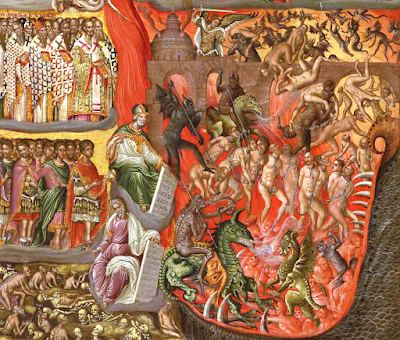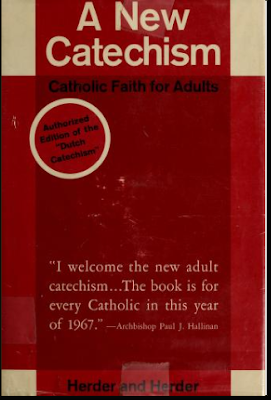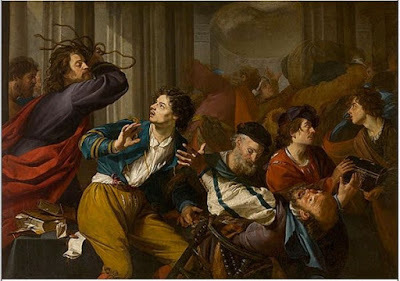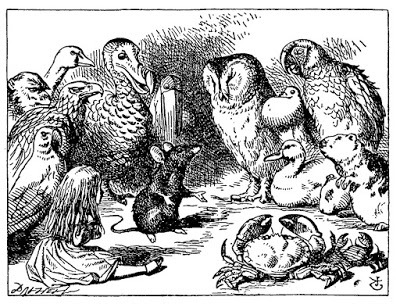Stephen Roney's Blog, page 257
February 8, 2020
Interesting Times
 Icon of the Second Coming.
Icon of the Second Coming.Thesis: every thirty years or so, the world changes in a sudden, dramatic way.
1930. Stock market crash, 1929. Hitler rises to power, 1932. FDR rises to power, 1932. The Great Depression, “New Deal” big government “liberalism,” and the struggle with Nazism.
1960. Kennedy elected, 1960; assassinated 1963. Beatles record “Love Me Do,” 1962. The Vietnam War. The Sixties.
1990. Berlin Wall falls, 1989. World Wide Web starts, 1991. Soviet Union dissolved, 1991. The end of the Cold War and the bipolar world order.
2020. I have a growing feeling that something like this is happening now.
The Wuhan coronavirus seems like the perfect storm: starting in Wuhan, the ideal point for it to spread throughout China. Starting just before the New Year’s Holiday, the ideal time for it to spread throughout China. The doctor who first raised the alarm censured by the government for “spreading false rumours”; and now he has died of the virus, creating a symbol and a martyr.
All this coming after a year of mass protests in Hong Kong.
If God really does intervene in history, if there really is such a thing as the Mandate of Heaven, it looks like the government of China is in trouble.
The cruise ship Westerdam is now wandering the East Asian Seas, denied anchorage in Japan because there are virus victims on board. This is the sort of detail that later becomes legendary.
In the meantime, Brexit happened last week. That already seems long ago. This may be remembered as the day the EU died. Boris Johnson won a crushing victory on the issue that seems to realign British politics, and throws the future of the Labour Party into doubt.
In the US, James Carville asks publicly whether the Democratic Party has lost its mind. The Iowa caucuses looked rigged, and at best grossly incompetent. The Dems look destined for a split now no matter who gets the nomination. If it is not Sanders now, his supporters will be outraged. But if it is Sanders, a declared socialist, it will amount to a takeover of the party by an insurgent force.
In the meantime, Trump was quickly and easily acquitted, making the long march to impeachment look like an irresponsible use of power and a waste of public time and money. Trump’s SOTU address was strong enough to perhaps be remembered as historic, and Nancy Pelosi’s stunt of ripping it up at the end looked deranged. Taken together, it looks as though the Democratic Party is imploding.
Canada is innately conservative, and so we never see such sudden drama. But things have been going weird lately here too: the implausible revelation of the PM’s blackface, the turmoil in the Tory Party, everyone backing away from the leadership as though it were radioactive. It feels as though nobody is in charge.
Let's hope God is.
'Od's Blog: Catholic and Clear Grit comments on the passing parade.
Published on February 08, 2020 04:16
February 7, 2020
The Thrashing About of a Great and Dying Beast
'Od's Blog: Catholic and Clear Grit comments on the passing parade.
Published on February 07, 2020 15:26
Bienvenue a Montreal
'Od's Blog: Catholic and Clear Grit comments on the passing parade.
Published on February 07, 2020 15:00
The Death of Christianity Foreseen
 A dying Pentecostal church in Mexico
A dying Pentecostal church in MexicoMy left-listing buddy Xerxes is convinced, as always, that Christianity is in decline, and “the agnostics are winning.” He presumably does not say this with any joy, being himself intimately associated with the United Church, the left aorta of Canada’s Protestant mainstream.
Rather, he seems to be consoling himself with the thought that everyone is going down with all hands, not just his own church. So it is not as though they might be doing anything wrong.
But I think saying “the agnostics are winning” is deeply misleading. Worldwide, atheism and “agnosticism” is on the decline. In North America, the real growth is in “spiritual but not religious.” I expect the reader has heard this phrase often, as I have.
The only way to make that oxymoron coherent, it seems to me, is to read it as “religious in principle but not affiliated.”
Xerxes notes that megachurches still grow exponentially, but then they commonly decline when a particular pastor dies. This seems to illustrate the principle: people want religion, but no longer have brand loyalty.
The first obvious reason why this is so is that people increasingly think about religion like consumers. Partly, they have a greater range of choices, living more and more in larger urban centres. Partly, they have fewer existing family and social ties making them feel committed to a particular ecclesiastical community.
Another reason, it seems to me, although Xerxes is eager to deny it, is that mainstream denominations and clergy have lost their own faith, and so have little on offer. When you hear all the same things at church as you hear on TV or at the mall, why go to church?
Another reason, I suspect, is that, with growing prosperity and so growing sense of privilege, many people are less inclined to submit to a moral code of any kind. They want a purely “feel-good” religion that does not require anything of them. Moving from church to church tends to preserve that option—of not being bound by anything.
I see this in the growing interest in Eastern religions, or “New Age.” You just pick and choose what sounds pleasant, and leave whenever it gets hard.
The lower rate of Sunday attendance, I think, also involves a separate issue. There are just a lot more options for what to do with your free time today than there once were. Back in the day, listening to a good sermon was the high point of a Toronto weekend, and the best were summarized in the Monday papers. Year by year, more options have become available, while the quality of church services has barely changed in any way—with, at times, the exception of this or that megachurch. Of course attendance will have gone down. We have seen a similar decline in attendance at social clubs of all kinds, voluntary associations, bowling alleys, movie theatres. You name it. When I was a kid, the most fun was to go out and play scrub baseball until the sun went down. I can’t get my own kids to put down their tablets long enough.
But Xerxes is also wrong to maintain that all Protestant churches are declining.
“And don’t protest that congregations in Texas or Arizona still have packed pews and booming Sunday schools. They’re also declining. They just lag 40 years behind the Canadian experience, 70 years behind the U.K. and Europe.”
The basic assumption here is flawed: that the US and Canada are following a European trend, but lagging far behind. Since the Second World War, the US has been culturally dominant: while there are smaller waves that have moved in the opposite direction, most things start in California. This seems like much too big a wave to be moving in the opposite direction. And it seems wildly improbable for any cultural wave, in these days, to lag as much as seventy years in moving from continent to continent.
Rather, I think Europe and North America diverge here because Europe was profoundly dispirited by the two World Wars, and lost their cultural confidence in a way the US and Canada, far less affected, did not. Hence the more aggressive abandonment of the old cultural verities there—the entire continent seems to have been trying to commit suicide since 1918.
But even with the overall decline of Christianity in Europe, worldwide, the growth of Christianity is explosive. Pentecostalism, in particular, is growing, and even in North America, both Pentecostalism and officially “nondenominational” congregations are growing. It is only the Protestant mainstream that is in decline.
'Od's Blog: Catholic and Clear Grit comments on the passing parade.
Published on February 07, 2020 11:05
Pelosi as the Grinch Who Stole the SOTU Address
Trump’s superpower is that he is a great showman. He showed that talent at its apex in his State of the Union Speech. He was like a confident ringmaster, with little pieces of business coming up regularly to maintain interest.
Nancy Pelosi tried her own hand at Trumpian showmanship with her dramatic visual, ripping up his speech as it ended. But she did not get it right.
My Filipina wife does not follow US politics closely. Currently in the Philippines, she was unaware of the Iowa Caucuses snafu.
But she knew all about Nancy Pelosi ripping up Trump’s speech.
“That was so uncivilized,” she commented. “She should be impeached.”
Coming right after Trump’s feel-good performance, his relentless recitation of good news and audience heartstrings jerked, and just as he was saying "God Bless America," Pelosi looked a lot like the heavy in a wrestling match, doing something cartoon-level evil.
People love to watch the villain; but they do not cheer her. They are more likely to come out for the opportunity to vote against her.
My wife's next observation was that Pelosi looked either drunk or drugged. I actually thought so too.
It seems to me significant that Pelosi has now come out with the charge that Trump, during the address, seemed to her "a little sedated."
Viewers can watch and judge for themselves just who of the two looks sedated; but the fact that Pelosi would come out with the charge seems to me corroborating evidence that she was indeed on drugs of some sort. She realizes she looks drugged, and seeks to distract attention with the charge. It is a typical ploy.
Kinf of like charging Trump with Russian collusion after Hillary and the Democrats engaged in Russian collusion; and then with Ukrainian bribery after Biden engaged in Ukrainian bribery. There is a distinctive pattern forming here.
Perhaps the bigger takeway is that we may be watching some great beast entering its death throes.
'Od's Blog: Catholic and Clear Grit comments on the passing parade.
Published on February 07, 2020 10:36
February 6, 2020
Dutch Catholic Disease

When I was young—my brother thinks I was ten or eleven, but I must have been at least fourteen—I rebelled against the Catholic faith.
I had attended Catholic schools, so I ought to have had some reasonable grounding. But the catechism I had been taught in Montreal, beyond grade 2, had been the spongey, bland stuff about butterflies and rainbows and God creating this beautiful world we live in. The Hallelujah chorus.
I remember little. I remember far better the bits of the Baltimore Catechism I had learned in Grade 2; that made sense. But not this vague happy-happy-joy-joy bunkum.
Knowing too well that the world was hellish, this was hardly solace for me. And it seemed clear that it was not just that these guys had no idea. This was propaganda for the way things were, and for what powers might be. I rebelled against such tripe, just as Jesus did, and against the false God it worshipped, a figure strikingly like Orwell’s Big Brother.
What I needed was Jesus’s teaching; instead, this is what the Pharisees taught.
My father, when I told him of my discontent with it all, forced me to read the “Dutch Catechism.”
Confirming all my misgivings.
The Dutch Catechism is perhaps little remembered now; even though it is sometimes called “the notorious Dutch Catechism.” It was the big bestseller among progressive Catholics in the years after Vatican II. It is no doubt the main reason the faith is now almost dead in the Netherlands.
It doubled down on the feel-good approach. The actual title was “A New Catechism: Catholic Faith for Adults.” Two red flags: “new” and “for adults.” The implication was that the teachings folks were familiar with were outmoded and childish. Whoever wrote it took seriously none of this supernatural Son of God stuff. That was just a lot of double-talk to keep the peasantry quiet. We sophisticates, of course, knew better.
This catechism discounted miracles as products of the imagination. Satan was only “a force endowed with personality.” Angels were forces of good. Demons were merely symbols of evil. Purgatory was sublimated into a vague concept of the need for “purification.” Praying to the saints for intercession was an “old custom whose inspiration through faith must be noted.” Mention of virgin births or transubstantiation was avoided.
It introduced man’s essential nature as questioning, and proceeded to raise questions without giving answers.
Nothing was left but a dull materialism and Rotarian morality.
Clearly, the Catholic Church had positioned itself against the supernatural.
What first turned me back to the church was Humanae Vitae. Being teenaged and preoccupied with sex, I did not like the teaching on birth control; but I had to respect it. Here at last were rules. And the teaching against abortion was like a distant beacon in a tempest at night: at last someone was prepared to stand up for morality and the oppressed instead of just pandering to the well-nourished. At last somebody believed in something.
Next in importance was that phrase in the Nicene Creed, “maker of all things, visible and invisible.” It contradicted the Dutch Catechism, and hinted that the original teaching was something deeper. It was aware that there was more to life than the material.
At seventeen or so, I was reminded by a Pentecostal friend of the Biblical passage “consider the lilies of the field…” I had forgotten it, or overlooked it. This clearly showed that the original Christian moral teaching was not the vapid “work ethic” notion that the point of life was earthly and material success.
It took many more years to recover from the damage done to my spiritual life by the Dutch Catechism and the anti-religious attitude it represented. If I have fully recovered even now.
Appallingly, while the Dutch Catechism itself has faded in influence, similar cynical and irreligious views are visible in the Church today.
I read of a priest omitting the Nicene Creed from his masses, “so as not to offend ecumenical sentiment.”
I read of prelates, even cardinals, using the priesthood as a cover for a homosexual lifestyle.
I now read of the Pope himself lamenting that income inequality is causing the growth of world poverty.
Problem: world poverty is actually declining? Where did the Pope get such a false idea?
It conforms, not with reality, but with Marxist theory. This is what Marx expected to happen.
So it seems that Pope Francis believes in Marxism so strongly that Marxist dogma trumps evidence.
This is not a trivial issue: no sin could be worse than turning the young and questing from religion. Jesus warned that it would be better for such false teachers to be thrown into the sea with a millstone around their necks.
'Od's Blog: Catholic and Clear Grit comments on the passing parade.
Published on February 06, 2020 13:24
Righteousness
 Fighting for truth, justice, and the American way...
Fighting for truth, justice, and the American way...Blessed are those who hunger and thirst for righteousness; for they shall be satisfied.This beatitude implies that those who seek righteousness, who most eagerly strive for the moral good, are those who have themselves been treated unjustly.
One does not hunger and thirst surrounded by food and wine.
So this beatitude describes someone whose overall experience of the world is one of injustice.
This again puts the lie to the “Hallelujah” chorus of some contemporary Christian thought.
It also puts the lie to the common modern psychological claim that being abused causes one to abuse, and being favoured causes one to treat others better. This idea, now so widespread, is social and spiritual poison.
This is also an argument for Purgatory.
A bad person fears punishment.
A good person, one who hungers for righteousness, does not fear punishment as much as injustice.
Such a person could not accept entering Heaven and the divine presence without atoning for any wrong they had done.
'Od's Blog: Catholic and Clear Grit comments on the passing parade.
Published on February 06, 2020 08:06
February 5, 2020
Democracy Dies in Darkness? Democracy Dies in Des Moines
 Feminist icon and 45th governor of Alabama Lurleen Wallace
Feminist icon and 45th governor of Alabama Lurleen WallaceWith 62% in, Buttigieg seems to be edging out Sanders in Iowa.
I had predicted a blowout for Sanders.
On the other hand, the delay in counting the vote, makes the results look dubious. That, and the poll just before the vote that was pulled; and the other polls showing Sanders way up, and Buttigieg flagging.
We know the backrooms would prefer a Buttigieg win. We know the Dem establishment’s history of stacking decks against Sanders. We know the Dem establishment is prepared to rig the process, because they did in 2016.
It is generally better to assume typical human incompetence before suspecting active malice. And yet, the series of circumstances seems implausible. It seems odd that, if the app was not working, it was not possible to fall back to the system they had always used, and accept results by phone. It seems odd that, a day later, they could report only 62% of the vote, with no update since. Anywhere else, such a delay would mean only one thing: they need the time to doctor the results.
Jeffrey Epstein did not kill himself, and Pete Buttigieg did not win the Iowa caucuses.
But let’s pretend he did.
Conventional wisdom is that Iowa usually leaves only three viable candidates. I think that is true this time. Buttigieg has overtaken Biden and Klobuchar as the establishment favourite. They are probably done.
Sanders has established himself as leader on the left. Warren may hang on to try her luck in New Hampshire.
The other candidate still viable is Michael Bloomberg. He avoids the cut by not being present.
Buttigieg has a puny resume; and this is a weak, dubious win. Bloomberg probably has a shot at challenging him for the anti-Sanders vote once his weakness sinks in.
In the meantime, the media operatives have their lede. They are making much of Buttigieg’s supposed win as historic, in overcoming or suggesting the end of public prejudice against gays. “The first openly gay candidate to win Iowa.”
I think this is fake news. Buttigieg’s qualifications as a presidential candidate are absurdly slight. Mayor of South Bend? Being gay is almost his only qualification for the job. If we won, he won BECAUSE he is gay, not in spite of it.
And this continues a familiar pattern.
Barack Obama was conspicuously underqualified as a first-term senator when he won Iowa and the nomination in 2008. People voted for him because of the colour of his skin—as Biden noted at the time.
Hillary Clinton had, on paper, qualifications to justify her selection in 2016. On the other hand, hailing her as the prospective “first female president” was another gimmick. She would be far from the first wife or a former politician to stroll into office on his coattails. Nobody hailed it as historic when Lurleen Wallace succeeded her husband George as Alabama governor back in 1967. Or when Isabel Peron succeeded her husband Juan as Argentine president in 1974. She succeeded not despite being a woman, but because she was a wife.
The moral of it all is that there is no discrimination against gays, or blacks, or women. They are systematically favoured now by the establishment, and have been for some time.
On the other hand, nobody makes anything of the fact that, if Bernie won, he would be the first Jewish president.
Certainly not the Sanders campaign. They know if they did, it would lose, not gain, votes.
'Od's Blog: Catholic and Clear Grit comments on the passing parade.
Published on February 05, 2020 06:08
February 4, 2020
Blessed Are the Meek
 Jesus modelling meekness
Jesus modelling meekness
Blessed are the meek
For they shall inherit the earth.
This beatitude has earned praise from Gandhi, and criticism from Nietzsche, who described it as a “slave morality.”
Both assume it means to bear injustices patiently, without resisting. The “turn the other cheek” gambit—or at least, both passages are given this same interpretation.
But is this right?
The obvious objection is that Jesus himself is not meek. He openly berates the authorities, the scribes and Pharisees. He drives moneychangers out of the Temple as though he owns the place. He says he owns the place. He more or less declares himself the rightful king; at least, he won’t deny it.
You might say Jesus is unique. He is fully divine; we are not. But we are also all told to “imitate Christ.” John the Baptist is also conspicuous in condemning civil and religious authority; and Jesus declares him the greatest man of woman born.
Jesus concludes the Beatitudes with the commandment to “let your light shine”; which again does not sound like meekness in this retiring, submissive sense. He calls such beatified people prophets; and the prophets, again, were not submissive or meek in berating governments, kings, or the popular consensus.
So bearing injustices passively cannot be the meaning of the word “meek” here.
The original Greek term refers most literally to a bridle as placed on a horse: “blessed are the bridled.” The image seems kin to Jesus’s analogy of sheep and goats: the “meek” are those who submit to guidance, rather than doing as they wish.
But then the necessary question is, who is the rider? Who is the shepherd? For Jesus makes the point that this matters vitally: false shepherds are common on the ground.
Obviously, the proper shepherd is God. It is Jesus, who says “I am the good Shepherd,” and “my yoke is light.” As William Blake clarified, “Humble before God; not before men.”
This means the opposite of the usual understanding, in an important way. Being obedient to God means acting against injustice, rather than submitting to it. Injustice is an offense against God.
And this is just the behavior Jesus, John, and the prophets model to us. Proper meekness requires fighting wrong.
Such meekness is more than just a matter of restraining desires; that is covered by “Blessed are the poor in spirit.” This is restraint of self, of the will, the opposite of pride. To use the current psychological jargon, it is the opposite of narcissism. It overlaps the current psychological term “low self-esteem”; but modern psychology cannot distinguish, as Blake could, between humility before man, and before God.
Fighting wrong commonly requires a sacrifice of self. Self-interest most often suggests going along to get along with whoever is powerful, regardless of the morality of the situation.
We must see instinctively that this is immoral; which is why Nietzsche earned so many listeners for his condemnation of such false, co-dependent “meekness.” He would be right, if this is what the Bible indeed meant.
Perhaps the most surprising aspect of this Beatitude is that it promises a reward on earth: “For they shall inherit the earth” (or, “the land.”) Not in heaven, but now, in this life.
But perhaps this should not surprise; it is the premise of the Old Testament. Jesus rewards the Hebrews with land for their submission to his covenant, taking it away from the Canaanites for their depravity.
Is it true? If we trace history, does success and prosperity come to those who submit to the moral law?
It seems to me that it surely does not at the individual level: for individuals, the advantage at least as often goes to those who cut corners and act cynically, so long as they are not caught. There is experimental evidence that this is so.
But it does seem to work at the group level. And Jesus uses the plural.
As one would expect: deferring to the will of God, over self-will, means that people will work in tandem for the general good.
'Od's Blog: Catholic and Clear Grit comments on the passing parade.
Published on February 04, 2020 11:16
Our Correspondent Reports Live from the Iowa Caucuses

‘What I was going to say,’ said the Dodo in an offended tone, ‘was, that the best thing to get us dry would be a Caucus-race.’
‘What is a Caucus-race?’ said Alice; not that she wanted much to know, but the Dodo had paused as if it thought that somebody ought to speak, and no one else seemed inclined to say anything.
‘Why,’ said the Dodo, ‘the best way to explain it is to do it.’ (And, as you might like to try the thing yourself, some winter day, I will tell you how the Dodo managed it.)
First it marked out a race-course, in a sort of circle, (‘the exact shape doesn’t matter,’ it said,) and then all the party were placed along the course, here and there. There was no ‘One, two, three, and away,’ but they began running when they liked, and left off when they liked, so that it was not easy to know when the race was over. However, when they had been running half an hour or so, and were quite dry again, the Dodo suddenly called out ‘The race is over!’ and they all crowded round it, panting, and asking, ‘But who has won?’
This question the Dodo could not answer without a great deal of thought, and it sat for a long time with one finger pressed upon its forehead (the position in which you usually see Shakespeare, in the pictures of him), while the rest waited in silence. At last the Dodo said, ‘Everybody has won, and all must have prizes.’
‘But who is to give the prizes?’ quite a chorus of voices asked.
‘Why, she, of course,’ said the Dodo, pointing to Alice with one finger; and the whole party at once crowded round her, calling out in a confused way, ‘Prizes! Prizes!’
Alice had no idea what to do, and in despair she put her hand in her pocket, and pulled out a box of comfits, (luckily the salt water had not got into it), and handed them round as prizes. There was exactly one a-piece all round.
There is a reason why it is called nonsense literature.
Well done, Democrats!
'Od's Blog: Catholic and Clear Grit comments on the passing parade.
Published on February 04, 2020 07:37



